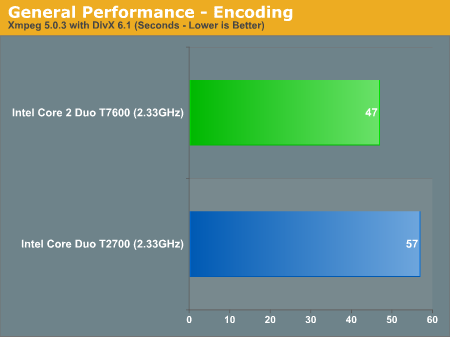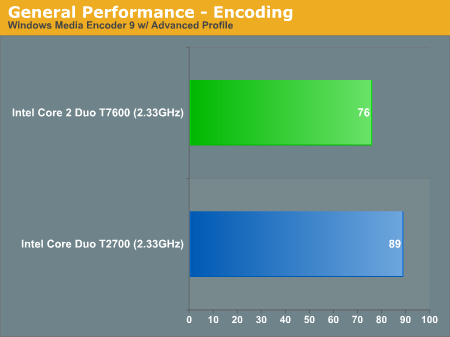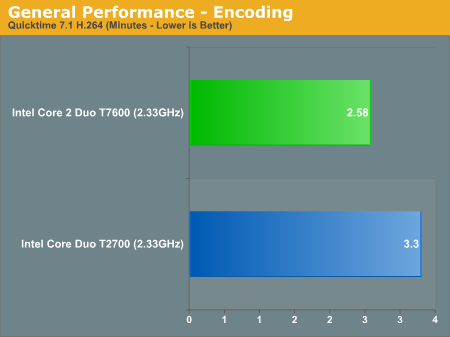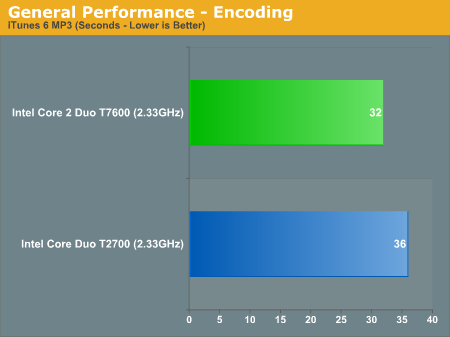Mobile CPU Wars: Core 2 Duo vs. Core Duo
by Anand Lal Shimpi on August 3, 2006 9:25 AM EST- Posted in
- CPUs
Encoding Performance using DivX 6.1, WME9, Quicktime (H.264) & iTunes
Multimedia encoding is typically a very good CPU benchmark, with performance that scales very nearly linearly with faster CPU clock speeds. Video testing was conducted using three popular codecs and applications: Xmpeg 5.03 with DivX 6.1, Windows Media Encoder with WMV9, and QuickTime 7.1 with H.264. The complexity of the encoding process increases as we move from DivX to WMV9, and H.264 encoding is in a league of its own in terms of the amount of CPU time required. Audio encoding performance was also tested using iTunes; MP3 encoding is less time-consuming and video encoding, but it continues to stress CPU performance.
Media encoding is a strong point of Intel's Core 2 Duo processors on the desktop, and the same holds true here on the mobile side:

DivX performance is improved considerably, with a 17.5% increase in performance at the same clock speed as Core Duo.

Windows Media Encoder 9 is really no different, showing a 14.6% performance advantage thanks to Core 2 Duo.

Our most strenuous encoding test, the Quicktime H.264 encode, is 21.7% faster with a Core 2 Duo installed than with a Core Duo running in our test notebook.

Even MP3 encoding is improved by 11.1% with the new chip.










46 Comments
View All Comments
juanpoh - Friday, August 4, 2006 - link
Looking at http://www.intel.com/products/processor/pentiumm/i...">Intel Pentium M link, only 915 and 855 chipset is supported. However 945 chipset is listed as supported in http://www.intel.com/products/processor/celeron_m/...">Intel Celeron M link.jaybuffet - Friday, August 4, 2006 - link
I have the nx9420 notebook with the 945pm chipset... i was on hp support yesterday, and they said they would not support upgrading the CPU.. does that mean i am SOL because they wont upgrade the BIOS to support it?Pjotr - Friday, August 4, 2006 - link
Please correct the percentage numbers on http://www.anandtech.com/cpuchipsets/showdoc.aspx?...">http://www.anandtech.com/cpuchipsets/showdoc.aspx?..."17.5% increase in performance" -> "17.5 % less time used" OR "21.3 % increaase in performance"
Same mistake for all other time based benchmarks.
shecknoscopy - Thursday, August 3, 2006 - link
Given the nearly identical architectures of the desktop Conroes and the new Merom chips - how well do all of you think the two would stack up in a direct side-by-side comparison? This is open to blatant conjecture, of course, as the necessary hardware to <b>really</b> make a single-variable experiment isn't out there. But for those of us considering mobile-on-desktop options, how much of a performance cut would we see jumping from a Conroe to a Merom?IntelUser2000 - Saturday, August 5, 2006 - link
Intel mentioned something about having different prefetchers that match the market, meaning Woodcrest's Prefetchers are fit for workstation/server, Conroe for desktop, Merom for mobile applications(performance/battery life).
If you look at Core Extreme X6800 vs. Core 2 Duo E6700 benchmarks, you can see that in some reviews the differences are greater than the 267MHz clock difference(10% clock difference). Maybe Core Extreme has superior prefetchers to the Core 2 Duos, giving advantage in select few applications.
Sunrise089 - Thursday, August 3, 2006 - link
This was the exact question I just signed on to ask....so I await and answer as well.shecknoscopy - Thursday, August 3, 2006 - link
Woohoo! Great minds think alike, eh? Also, so do ours!JackPack - Thursday, August 3, 2006 - link
Which stepping did you use in this test? B1?EagleEye - Thursday, August 3, 2006 - link
I think the asus barebones configuration is mislabeled in this article. The s96j has the WXGA 1280x 800 screen while the z96j has the WSXGA 1680x 1050 screen. They either had an s96j or the native resolution is wrong as they stated it.Kalessian - Thursday, August 3, 2006 - link
I noticed that, too.